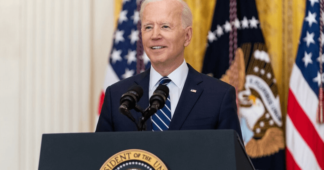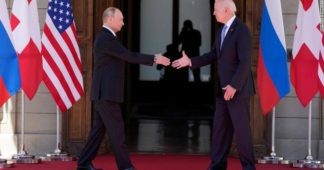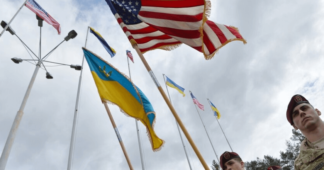With threats of sanctions and military aid, US saber-rattling over Ukraine is escalating an already tense confrontation with Russia. It’s a dangerous game that the United States should stop playing.
By Branko Marcetic
Jan 22, 2022
Already, voices are clamoring for war, warning that US “credibility” is on the line if Biden fails to deter Russian president Vladimir Putin, and we’re seeing the usual accusations of “appeasement,” complete with references to Neville Chamberlain and Munich as hawks push for a more aggressive US response. As the crisis continues unfolding, you’re going to hear a lot of the same things from the narrow spectrum of opinion allowed in the mainstream press and within the halls of Congress. What you won’t hear are these crucial points.
This Is About NATO Expansion
Some history is in order here. NATO is a Cold War artifact originally designed to counteract the Soviet Union and its Warsaw Pact on the international stage, and stop the Soviets from expanding westward across Europe. When the Cold War ended and the Soviet Union dissolved, there was, ostensibly, no more use for NATO, and both the George H. W. Bush and Bill Clinton administrations told Russian leadership the alliance wouldn’t expand eastward.
But privately, Bush’s Pentagon urged Washington “to leave the door ajar” for Eastern European membership down the line — which is exactly what they did, under criticism from no less than Robert Gates, defense secretary for both Bush’s son and Barack Obama, and George Kennan, the father of the US anti-communist policy of containment. Between 1999 and 2020, fourteen countries joined the alliance, all of them from Eastern Europe and two of them scraping right up against Russian border. Kennan had warned this would “inflame the nationalistic, anti-Western and militaristic tendencies in Russian opinion” and “impel Russian foreign policy in a direction decidedly not to our liking.” Which, looking back in hindsight, is pretty spot on.
Putin has given the side-eye to this expansion for a while, but the inclusion of Ukraine would be a step further. Not only does the country share a far larger land border with Russia than any existing NATO member state, but there has always been a powerful contingent within the country that sees Ukraine as fundamentally part of Russia, or at least as a younger sibling. There is, in other words, a lot of national pride tied up in the matter for Russia, as well as considerable security concerns. Just imagine if Russia or China looked to add Mexico to a military alliance of Latin American states they headed, placing troops and weapons just over the fence from Texas.
Though the United States and NATO have always insisted the alliance isn’t directed against Russia, Moscow is understandably not convinced. After all, the Clinton administration itself justified expanding NATO by warning of the need to be on guard for “the possibility that Russia could … return to the threatening behavior of the Soviet period,” and Putin’s early suggestion to let Russia join NATO (albeit while jumping queue) or create a European-wide security pact was rebuffed.
One hardly needs to regard Putin as a saint to see how Western observers’ two-dimensional idea of him as a scheming supervillain blinds them to the way these security concerns play into his actions. Putin’s war with Georgia and annexation of Crimea are read in the United States as Hitlerian expansionism, but they were in large part motivated by fears of NATO expanding up to his doorstep. It’s much the same with this latest move, which is better interpreted as an audacious defensive gambit — which, as those previous wars suggest, doesn’t preclude the disastrous possibility of an invasion.
US Policy Has Been Increasingly Unpredictable and Dangerous
The point here isn’t to adjudicate who’s the good guy and who’s the bad guy. The point is that by any objective measure, this century Washington’s acted increasingly belligerent, erratic, and with little regard for the “rules-based international order” it claims to uphold, often with the support of NATO — making the alliance’s eastward creep all the more threatening.
Russian “Provocations” Are Part of a Tit-for-Tat Exchange
The SolarWinds hack of April suspected to have been carried out by Russia was the last of these. But before that, Washington carried out a hack and dump operation against a Russian company working for intelligence services. Of course, before that was Russia’s infamous 2016 election interference, also allegedly involving the hack and release of embarrassing documents, which itself was a response to Washington’s “democracy promotion” work in Russia, which Putin (not unreasonably) views with suspicion.
It’s worth noting that in May, US officials were tricked into admitting on camera that they “have a very, very active program throughout” Russia and were targeting the country’s legislative elections, meaning this political meddling — the likes of which Americans would justifiably balk at if it was revealed Beijing or Moscow was doing the same thing within US borders — is still going on. (And it would be naïve to assume there isn’t some Russian version of this going on within the United States, even if it’s not on the same scale).
You could go back through history like this, and Washington and Moscow would each point the finger claiming the other started it. Who’s right doesn’t matter for now. The point is that Russia has not been some supreme evil testing the United States unprovoked, but has instead been engaging in a pretty standard to-and-fro with a geopolitical rival.
The United States Is Close to Over-Stretching Itself
On top of all this, Israeli and former US officials are also urging Biden to threaten (and, if it comes to it, carry out) an attack on Iran, which his administration has explored doing.
That’s three militarily significant countries in three different regions that Washington is weighing up taking action against, and which could spark full-on conflict. Waging war against even one of these countries would be a tall order; imagine doing it simultaneously against two. This is absurd, especially given Washington’s track record over the past few decades against far less powerful countries: drawn-out defeat in Vietnam; even more drawn-out defeat in Afghanistan; and quagmire and chaos in Iraq.
Beyond this, it’s worth remembering just how extreme the US position is here. While the very idea of a “sphere of influence” for great powers is deeply warped and unjust, it’s also one of the basic pieces of geopolitical logic that structure the world — which is why the United States continues to operate under a version of the Monroe Doctrine (albeit a diluted one) that sees Latin America as its backyard. Yet Washington isn’t just claiming the continent it sits on as part of its strategic sphere; it’s doing the same for two entirely separate continents.
Any War With Russia Could Easily Spiral Into Nuclear War
Ordinary Americans should take no solace in their country’s missile defense systems, which don’t have the numbers to fend off a blizzard of Russian nukes, nor really the capabilities. At last count, since 2001, US intercept flight tests have been successful in ninety-two of 112 attempts, which would mean an awful lot of nuclear bombs dropping on US towns and cities should the worst ever happen. It’s a cliché that there are no winners in a nuclear war, but it’s also true.
While any conflict with Russia over Ukraine would attempt to avoid this scenario, given that errors and false alarms have nearly led to catastrophe even in times of relative peace — and given that Washington and Moscow lack the institutional mechanisms of the Cold War that were used to prevent things from spiraling out of control — armed conflict by its very nature risks taking us to this unspeakable point.
This would be an unconscionable gamble in any scenario but especially in this context. Putin is acting, albeit very illiberally, to secure Russia’s borders against what is, to him, an eminently plausible threat; the United States has no obligation to defend Ukraine, a country nine thousand miles away that isn’t in NATO; and there’s no guarantee any invasion would even go particularly well for Putin, instead of ending up like one of the many quagmires the United States has gotten itself in over the past two decades. A war over Ukraine would simply be madness
Published at jacobinmag.com
We remind our readers that publication of articles on our site does not mean that we agree with what is written. Our policy is to publish anything which we consider of interest, so as to assist our readers in forming their opinions. Sometimes we even publish articles with which we totally disagree, since we believe it is important for our readers to be informed on as wide a spectrum of views as possible.











